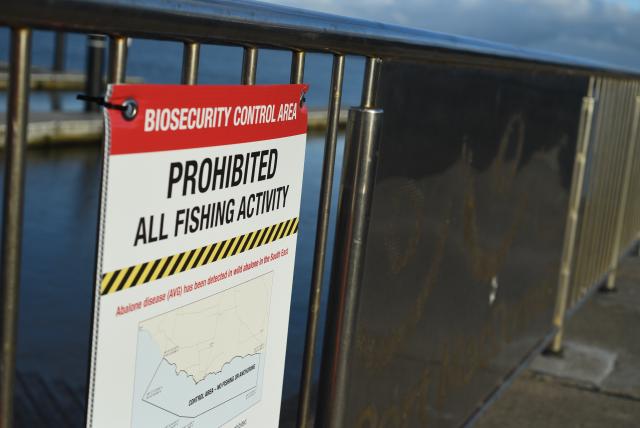
Charlotte Varcoe
RESTRICTED fishing activities have now been lessened along the South Australian shoreline despite a control area being extended to Southend to help with the detection of the Abalone Viral Ganglioneuritis (AVG) virus continues.
The control area will remain in place until March 27 with a buffer zone also in place from Southend to the Murray Mouth.
All fishing activities are allowed within the buffer zone with fishing and diving equipment having to be decontaminated alongside strict guidelines.
Anchors must also be cleaned when raised and any catch is able to be consumed, disposed of or returned to the buffer zone.
Restrictions to fishing in the controlled area still include abalone, rock lobster and spear fishing with reef diving also banned.
There is still a ban on use of anchors in the controlled areas as well as a ban on anything taken from the waters not to be returned.
Last week, it was announced the virus was found at Breaksea Reef near Port MacDonnell for the first time in South Australia.
Hundreds of dead abalone have since been detected with the initial control area reaching from the South Australian-Victorian border to Nene Valley.
Now, Primary Industries and Regions (PIRSA) have announced an extension of the control area in an effort to manage the deadly outbreak.
Fishing remains completely prohibited along the shoreline with a temporary decontamination station is now in place for commercial fishers at Port MacDonnell consisting of high-pressure water cleaning equipment, detergent and supervision by PIRSA compliance officers.
Commercial and recreational rock lobster licence and registration holders have received the green light to retrieve their pots.
Rock lobster pot licensees were not initially not allowed to retrieve their pots until Friday when the department announced restriction changes.
Steps were put into place a week after the restrictions were put in place to allow for the retrieval of the pots with any catch or other organic materials to be left at sea where the pot was retrieved.
Collections are restricted to daylight hours between sunrise and sunset with all licence and registration holders being contacted by PIRSA.
They must notify PIRSA before entering the control area to retrieve their pots.
Acting chief veterinary officer Dr Elise Spark said once boats had returned to shore, pots must be washed away from the ocean with detergent and freshwater.
“Cleaning must take place in an area where none of the washdown can re-enter the marine environment,” Dr Spark said.
“Make sure all surfaces of your pot are covered with detergent, and rinse with fresh water, before air drying all equipment for a minimum of 72 hours outside, ideally in the sun.”
Dr Spark said all commercial fishers must return to Port MacDonnell to decontaminate while recreational fishers may decontaminate at a suitable site where “runoff is unable to return” to the sea such as at their home or at a carwash station.
Recreational fishers were also able to utilise the Port MacDonnell facilities.
Failure to comply with control area restrictions may also result in fines.
Minister for Primary Industries Clare Scriven said the development was a “big step forward”.
“We have been pleased that both commercial fishers and recreational fishers have been so willing to cooperate,” Ms Scriven said.
“We know this disease has not been in South Australia before, it has been in Victoria for a number of years but it is not something we can control in terms of transport.
“We cannot control the oceans but what we can control is human movement and activities which could spread the disease.”
Ms Scriven said it was “really important” the disease was not spread through human activities hence the decision of the exclusion zone.
“We have had compliance officers in the area explaining to people the importance of not spreading the disease and my understanding is once people are aware they have been willing to cooperate,” she said.
“We know this is a virus which can spread along coastlines and whilst we cannot control those natural impacts we can control additional spreads through human activity”
Ms Scriven said she believed the response by the government was “swift”.
“I understand the positive tests came through late on Thursday and on Friday morning the bans were in place and communication was going out,” she said.
More information is available on the PIRSA website as the situation continues to develop.







